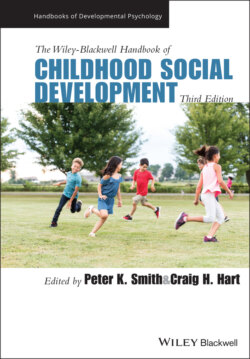Читать книгу The Wiley-Blackwell Handbook of Childhood Social Development - Группа авторов - Страница 29
Moral development
ОглавлениеChildren’s moral reasoning, emotions, and behavior were at the forefront of investigation during this era. Research on moral reasoning, arising from constructivist perspectives, outstripped that conducted on other aspects of moral development, including children’s moral emotions (e.g., guilt) and moral behavior. Conceptual propositions (e.g., stage theory; Kohlberg, 1969) spurred investigation and led to discoveries that extended knowledge about continuities and change in children’s moral reasoning. Eventually, claims about the cognitive bases and universality of stage progressions were tempered by evidence suggesting that moral deliberations were shaped by situational factors (e.g., form, context, realism of ethical quandaries) as well as by culture, cohort, and personal experience (Nucci, & Gingo, 2011).
Another impetus for inquiry was social domain theory (Smetana et al., 2014) and, in particular, the premise that morality constitutes one domain of social knowledge, among others (e.g., knowledge about social norms and conventions), that children construct and utilize as they mature. Empirical findings implied that children recognize domain differences, develop more mature reasoning patterns within domains with age, and judge infractions differentially, depending on the domain (Smetana et al., 2014).
Moral behavior was investigated primarily by examining children’s developing capacity to refrain from rule‐breaking and their ability to conform to moral standards (e.g., parents’ rules, values). Key objectives were to determine how and when children internalized moral rules (i.e., growth of conscience; Kochanska et al., 2010) and developed the ability to follow internalized rules, even in the absence of parental control. Other focal constructs included self‐control, self‐regulation, and delay of gratification. Evidence gathered on delay of gratification tasks, for example, indicated that children’s self‐control increased dramatically from the toddler through the preschool years (Cole et al., 2011), and correlated positively with brain maturation and maternal support (Bernier et al., 2010).
Investigators who studied moral emotions primarily focused on the development and determinants of guilt and shame. Such emotions were found to emerge in 2‐ and 3‐year‐olds, and correlated positively with both child factors (e.g., inhibited, fearful temperaments; female gender) and parenting practices (e.g., provision of support vs. anger following transgressions; Kochanska et al., 2002). Other findings suggested that children who manifested stronger expressions of guilt and remorse at early ages exhibited greater rule adherence and fewer moral transgressions at later ages (Tangney & Dearing, 2002).
